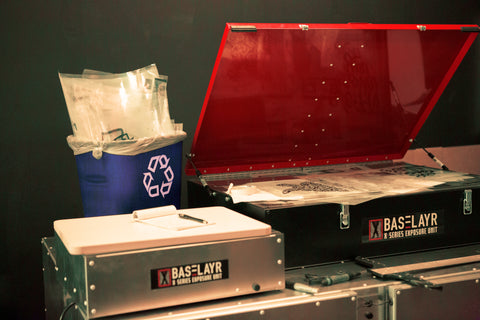Single-use plastic is wasteful. Every year, more and more plastic ends up in landfills, waterways, oceans, and even our bodies. It’s almost impossible to get away from single-use plastic in the 21st century. So what can screen printers do about it? Here’s one way to do your part: recycle used film.

PLASTIC WASTE IMPACT
Single-use plastic is plastic that is intended to be used only once before being disposed of: mostly in minutes. Think of plastic bottles, wrappers, bags, etc. Film transparencies are also on this list. Don’t feel too bad, though: avoiding plastic altogether is nearly impossible today. Though many industries—including screen printing—are making efforts to use alternative materials, there will always be plastic waste.
According to the Natural Resources Defense Council, 8.3 billion metric tons of plastic has been produced since the 1950s. Half of that amount has been produced in the last 15 years:
“Polyethylene terephthalate [PETE], one of the most commonly recycled plastics and the material that makes up most water and soda bottles, can be turned into everything from polyester fabric to automotive parts.”
So it’s possible to make more stuff out of plastic. That’s great, right? In theory, maybe. But 91% of all plastic produced isn’t recycled. According to Seed Scientific, plastic takes anywhere from 500 to 1,000 years to decompose. It’s just sitting in landfills, getting into waterways and oceans, and breaking into tiny particles called microplastics, which people consume without knowing it.
Not-So-Fun Fact: The average person consumes 70,000 microplastics every year. It’s so tiny, most don’t even notice it.
RELATED: HOW TO DO ECO-FRIENDLY SCREEN PRINTING
WHAT CAN SCREEN PRINTERS DO?
This might all seem like doom and gloom. Can one person really make an impact on this global plastics issue? Well, one person on their own might not seem like a lot. But the more plastic waste you recycle, the bigger impact you’ll have. And if everyone joins in? Forget about it.
So how do you cut down plastic waste in your screen printing shop? It’s easy. By recycling your used film, you’ll be stopping a lot of plastic waste from heading to a landfill.

HOW MUCH PLASTIC DO YOU USE?
Think about how much single-use plastic you use in your shop. Remember, this doesn’t include the knobs on your press or the plastic covering of your film printer. How many plastic things in your shop do you throw away once you’re finished with them?
Many plastic screen printing supplies and equipment are produced with recycled plastic. Take the EZ Grip Squeegee, for example. The handle is made with recycled plastic (don’t worry, you Lee Stuart Edition fans: it’s made from recycled plastic too). If you’re conscious about the plastic you buy, you might notice that you’re more sustainable than you think.
One area that sustainability doesn’t apply in screen printing is film. Let’s do some math. Say a shop uses five films in one day of production. That’s 150 a month, or 1,800 per year. If they need to reprint the films in order to fix something, they’ve used even more. That’s a lot of film that’s just going in the trash when they’re done with it.
Sure, you can save it if it’s a repeat job, or if it’s a brand design and they use it all the time. But if those films are for a one-time job, chances are many throw the films away once they no longer need them.
Instead of tossing used and unneeded film in the trash, recycle them! It’s super easy to do, and only involves one extra step in the screen creation process.
RELATED: REPEAT JOBS EASILY BY CATALOGING EVERY SCREEN PRINT
HOW TO RECYCLE YOUR FILM POSITIVES
The film recycling process is so easy, you could do it in your sleep. Here’s three simple steps to get it done:
- Find a recycler. If they recycle plastic, they recycle #1PETE. It’s the most common and simple plastic to recycle.
- Add the #1PETE recycling symbol to the art template, or somewhere on all the films. (You can always tape over it for printing.)
- Dispose of these films in the proper bin along with other plastic recyclables

Recycling your films really is that easy. If you’re an environmentally-conscious shop, recycling your films is a great way to be a little kinder to the planet without jumping through a bunch of hoops. Doing your part to keep the Earth clean feels good, doesn’t it?

